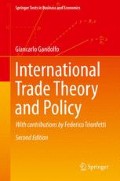Abstract
We have shown in the text the crucial importance of the strong factor-intensity assumption (i.e., absence of factor-intensity reversals); here we examine formally the conditions under which reversals are present or absent. Let us begin by establishing the relationship between capital intensity and relative price of factors; for this purpose we employ the equilibrium conditions that state the equality between the value of marginal productivity of a factor and its price (this must be equal in both sectors).
Access this chapter
Tax calculation will be finalised at checkout
Purchases are for personal use only
Notes
- 1.
- 2.
This is a term used by Deardoff (1982, p. 690) to denote a generalization (that he suggested) of the concept of covariance when one needs to correlate three variables symmetrically.
- 3.
The optimum conditions will give a differentiable mapping p = g(w), where p is the vector of commodity prices and w is the vector of factor prices. Global invertibility (or univalence) ensures that the inverse mapping \({\mathbf{w = g}}^{\mathbf{-1}}\mathbf{(p)}\) exists uniquely, namely a unique vector of factor prices corresponds to any vector of commodity prices exactly as a unique vector of commodity prices corresponds to any vector of factor prices; note that as we are considering global univalence, the conditions stated by the Gale-Nikaidô theorem must be satisfied.
References
Bhagwati, J. N. (1972). The Heckscher-Ohlin theorem in the multi-commodity case.
Brecher, R. A., & Choudhri, E. U. (1982). The factor content of international trade without factor-price equalization.
Chipman, J. S. (1966). A survey of the theory of international trade: Part 3, The Modern Theory.
Deardoff, A. V. (1982). The general validity of the Heckscher-Ohlin theorem.
Deardoff, A. V. (1994). The possibility of factor price equalization, revisited.
Deardoff, A. V. (1979). Weak links in the chain of comparative advantage.
Dixit, A. K., & Woodland, A. (1982). The relationship between factor endowments and commodity trade.
Ethier, W. J. (1984). Higher dimensional trade theory.
Ethier, W. J. (1982). The general role of factor intensity in the theorems of international trade.
Feenstra, R. C. (2004). Advanced International Trade: Theory and evidence (chap. 3).
Ford, J. L. (1982). The Ricardian and Heckscher-Ohlin explanations of trade: A general proof of an equivalence theorem and its empirical implications.
Ford, J. L. (1985). Comments on P.J. Lloyd “The Ricardian-Ohlin Explanation of Trade: A Comment on a General Theorem which is not General”.
Gale, D., & Nikaidô, H. (1965). The Jacobian matrix and global univalence of mappings.
Gandolfo, G. (1971). Mathematical methods and models in economic dynamics.
Harkness, J. P. (1978). Factor abundance and comparative advantage.
Harkness, J. P. (1983). The factor-proportions model with many nations.
Helpman, E. (1984a). The factor content of international trade.
Horiba, Y. (1974). General equilibrium and the Heckscher-Ohlin theory of trade: The multi-country case.
Jones, R. W. (1956). Factor proportions and the Heckscher-Ohlin theorem.
Lloyd, P. J. (1985). The Ricardian and Heckscher-Ohlin explanations of trade: A comment on a general theorem which is not general.
Neary, J. P. (1984). The Heckscher-Ohlin model as an aggregate.
Neary, J. P. (1985a). The observational equivalence of the Ricardian and Heckscher-Ohlin explanations of trade patterns.
Neary, J. P. (1985b). Two-by-two international trade theory with many goods and factors.
Samuelson, P. A. (1953). Prices of factors and goods in general equilibrium.
Svensson, L. E. O. (1984). Factor trade and goods trade.
Vanek, J. (1968). The factor proportions theory.
Author information
Authors and Affiliations
Rights and permissions
Copyright information
© 2014 Springer-Verlag Berlin · Heidelberg
About this chapter
Cite this chapter
Gandolfo, G. (2014). Appendix to Chapter 4. In: International Trade Theory and Policy. Springer Texts in Business and Economics. Springer, Berlin, Heidelberg. https://doi.org/10.1007/978-3-642-37314-5_20
Download citation
DOI: https://doi.org/10.1007/978-3-642-37314-5_20
Published:
Publisher Name: Springer, Berlin, Heidelberg
Print ISBN: 978-3-642-37313-8
Online ISBN: 978-3-642-37314-5
eBook Packages: Business and EconomicsEconomics and Finance (R0)

